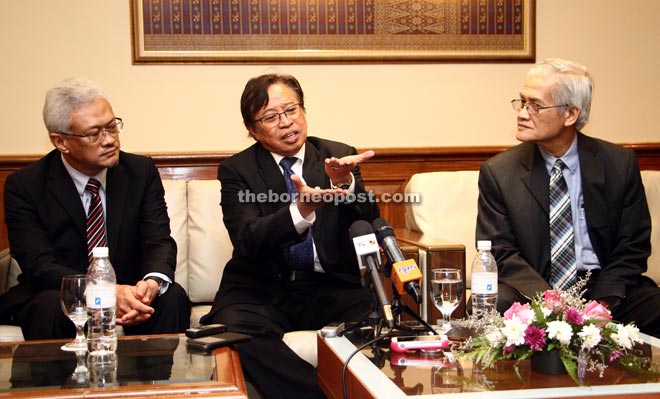
Abang Johari (centre) makes a gesture during the press conference. With him are UiTM Sarawak rector Prof Datuk Dr Jamil Ismail (left) and Assistant Minister of Land Development Datuk Abdul Wahab Aziz.
KUCHING: Housing Minister Datuk Amar Abang Johari Tun Openg has advised small and medium enterprises (SMEs) to tap emerging opportunities in the oil and gas industry rather than merely waiting for contracts from Petronas.
Speaking to reporters after representing Chief Minister Datuk Patinggi Tan Sri Adenan Satem to open the Third National Business and Economic Seminar 2015 here yesterday, he said for SMEs to succeed in the oil and gas industry, they needed to be familiar with downstream activities and oil-production cost.
“If you have a deep water reservoir of oil, you have to apply the technology that can go down to the deep water, but the cost per unit is high. When you have a reservoir of oil that is just a few metres deep, the cost per unit will be less. At the end of the day, it is the question of your bottomline.”
He said oil and gas were just raw materials, but SMEs could produce downstream products such as methanol, which is a by-product of gas.
“You crack the gas and you produce methanol. You crack methanol and you produce adhesive. These are the downstream activities that you must identify. Our SMEs can go and choose one of the by-products.
“You just cannot rely on oil and gas. What happened is our entrepreneurs only want contracts from Petronas. They should instead go and find out about downstream products from oil and gas and then produce new products themselves … meaning our entrepreneurs must be more innovative.”
On expertise in the oil and gas field, Abang Johari said there must be a roadmap to enable products to be produced based on the expertise of the present workforce.
“We are in a dilemma here. If we just promote low-level industry and at the same time produce graduates that are taught about the latest technology, then there is mismatch. So, we will end up employing low-skilled labour, leaving these graduates unemployed.”
In citing the palm oil industry as an example, he opined that the country, with the available expertise, should be producing new equipment to collect fresh fruit bunches (FFB), instead of relying only on human labour.
“There is a technology where you can pluck FFBs with sensor. It is a small tractor, with the arms installed with sensors
that will determine whether the FFBs are ripe or not. We should be producing this sort of equipment.”
